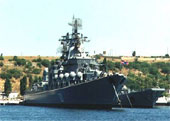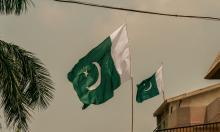USA comes into confrontation with 'Old Europe' as Ukraine sets to join NATO
The joint policy of the West does not exist – there is the position of the USA and the EU
There are several issues in the relations between Russia and Ukraine, the importance of which is understood by foreign countries as well. One of such issues is the stationing of the Russian Federation Black Sea Navy in the Ukrainian city of Sevaspotopol (the Crimea region). 
The Russian Black Sea Navy is virtually a foreign army base that is located on the Ukrainian territory. This is not an unusual phenomenon in world practice, especially if it goes about allied states. However, if an army base belongs to a non-friendly country, one may talk about occupation in this case. The Russian Federation is formally considered the successor of the USSR, although its opportunities to run active and independent policy are rather limited at this point. It concerns Ukraine too, albeit at a much greater capacity.
One can hardly refer to Ukraine as self-sufficient state. It had to take account of interests of more powerful states from the moment, when the country obtained independence. There were two major vectors of foreign policy: the European-Atlantic and the Russian vectors. The new Ukrainian government declined uncertainty and chose the first one. However, the problem turned out to be much deeper than it seemed at first sight. The European-Atlantic constituent makes up the West as a single whole. It is obvious, however, that the position of the West is not the same, as it was during the confrontation with the USSR. One can not say that the USA and Europe played one and the same role after the end of WWII and in the beginning of the Cold War era.
The convincing image of the common enemy provided unanimity of Brussels and Washington. In addition, Western Europe was active as the protectorate of the USA. “New Europe” treats Russia as an enemy from old memory, taking into consideration the new general line. As far as “Old Europe” is concerned, the "Russia as an enemy” image does not seem to be convincing for it. Furthermore, France gained profit from contradictions between the USA and the USSR during Cold War years. The European Union is currently trying to become the center of the force both politically and economically. Great Britain and “New Europe” are being viewed as agents of the American influence.
The joint policy of the West does not exist. There is the position of the USA and the EU, in which the pro-American lobby and the “Old European” stance come into opposition – between France and Germany, first and foremost. The differences are quite considerable. Western Europe is not interested in instability; France and Germany are trying to normalize relations with Russia.
Washington in its turn is concerned about the fact that the EU has been declaring its special independent opinions recently, which do not coincide with the point of view of its transoceanic ally. The situation makes the European Union become a competitor to the United States.
The Russian Black Sea Navy is not a problem for Europe; it is a problem for NATO and, therefore, for the USA. The new direction in foreign policy of the new Ukrainian administration will be easy to see from its attitude to the Black Sea Navy: it will show, which side Ukraine will be taking – the pro-American or the pro-European one. One may say that the Russian Black Sea will play the role of litmus paper at this point.
The division of the Black Sea Navy of the former Soviet Union could not improve the battling capacity: it only weakened the two sides to the benefit of the third one. As a rule, problems between Russia and Ukraine can bring only bad to the two states, although Ukraine loses a lot more than Russia. That is why, if the state of the Russian Black Sea Navy is unsatisfactory, it means that the Ukrainian Navy is in a disastrous condition. There are about 40 battleships in the Navy of Ukraine, although specialists doubt a lot about their battling capacities. Ukrainian authorities have already spent much time and energy on the only submarine of the national navy. The sub is being repaired at the Sevastopol-based shipyard of the Russian Black Sea Navy.
The treaty, which was signed between Russia and Ukraine in 1997, stipulated a lot of moot points in bilateral relations between the two countries. The treaty particularly runs that the Black Sea of the Russian Federation should be stationed in Ukraine's Sevastopol for the period until 2017.
The document eased the tension in the long-lasting contradiction. In addition, Russian and Ukrainian leaders started talking about the cooperation between the two navies. About 23,000 Sevastopol residents work at enterprises of the Russian Black Sea Navy. The former chairman of the European integration committee of the Ukrainian parliament, Boris Tarasyuk, has recently stated that the Russian Black Sea Navy should be stationed not in Ukraine, but on the Russian territory. The Ukrainian official apparently implied that Russia did not have to hope for prolonging the action of the above-mentioned treaty after 2017. It also brings up the idea that Moscow should be ready for revision of the previously concluded agreements.
An army base on the Ukrainian territory is an obstacle for Ukraine's membership in NATO. Needless to mention that the year 2017 is rather distant future in this respect.
The USA does not take much risk when it destabilizes the situation in Eurasia. The “export of instability strategy” takes quite an important place on Washington's list of political priorities. The USA actively supported Afghan Mujahideens against the USSR, Iraq against Iran, Pakistan against India, and Georgia, Ukraine and Moldova – against Russia.
As it could be seen from the experience with Afghanistan and Iraq, yesterday's ally could quickly become today's enemy. Consequently, it would be logic to surmise that the US administration might change its point of view regarding a friendly regime and find it corrupted, undemocratic and even totalitarian.
The pro-American lobby in the European Union is pushing Ukraine to a rather sad scenario. However, Ukraine plans to start the talks on its membership in NATO already in April of the current year.
Aleksei Kovalev
Subscribe to Pravda.Ru Telegram channel, Facebook, RSS!





